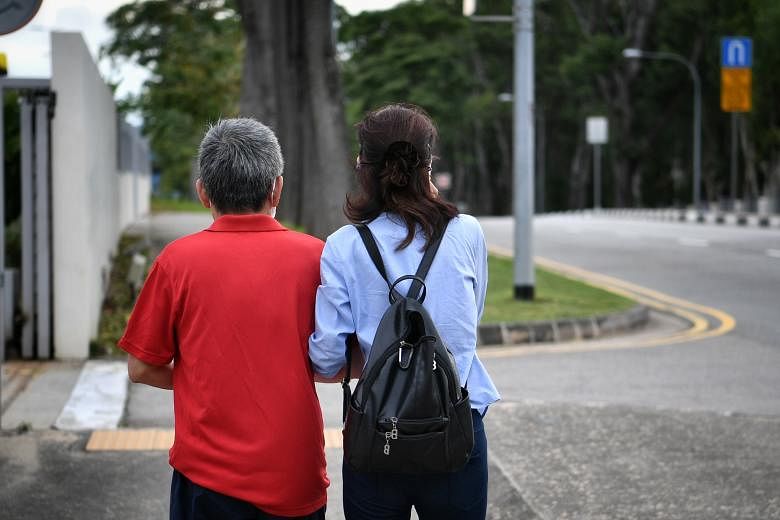More needs to be done to support caregivers who may struggle to look after a family member with mental health conditions and other issues, said lawyers with experience in such cases.
While intervention and treatment for mental health conditions seem like simple solutions, lawyers said the law now has provisions to order a psychiatric assessment to diagnose mental health issues only when someone has committed or is suspected of committing a crime.
But sometimes, it is a little too late for interventions.
Two years ago, Mr Tan Tian Chye hit his mentally ill daughter with a pole and strangled her to death after feeling overwhelmed by the immense pressure of caring for her.
A psychiatric report found that Mr Tan, 66, had a major depressive episode and significant caregiver stress while trying to pacify the needs of Ms Desiree Tan Jiaping, 35, court documents said.
Ms Tan was assessed in 2012 to have panic attacks with agoraphobia - a condition that made her anxious in unfamiliar environments, and "hypochondriacal preoccupations" or anxieties linked to health.
She was also diagnosed in 2018 with an unspecified anxiety disorder but refused medication - she was afraid she would become dependent on it. Last Monday, Mr Tan was sentenced to two years and nine months in jail but the sentence was backdated so he was released on the same day.
High Court judge Hoo Sheau Peng in court papers said: "As a society, it is critical to continue with efforts to improve and enhance access to mental health services. It is unfortunate that much needed help, support and intervention were not sought by or given to the Tan family during those years for their daughter, and thereafter, for the accused."
While support can be given to those who ask for it, lawyers said under the law, no one can be forced to be assessed or get treatment for mental health issues unless they do something dangerous to themselves or others.
For those who have been diagnosed with mental illness, the court can order treatment only after the person is sentenced for a crime.
Veteran lawyer Amolat Singh said: "On one hand, this makes sense because then anyone can point the finger and ask for someone to be remanded, and we're talking about taking away someone's liberties here. The question is, how do you create checks and balances that won't be abused. What should be the triggering mechanism for a person to be sent for treatment."
Mr Sunil Sudheesan, the head of the criminal department at Quahe Woo & Palmer, said the question of when to intervene is a grey area since those suffering from mental illnesses do not always pose an immediate danger to themselves or someone else.
He said: "The first thing is for caregivers to know how they can receive help. The next thing is to consider various forms of intervention and where to peg that intervention, meaning how to intervene and when the line is crossed. Now, it seems like serious intervention only takes place when a crime occurs. This may be too reactionary."
Lawyers said Mr Tan's case is not the first time caregivers have felt out of their depth dealing with a family member with mental health or other conditions.
For instance, in 2014, a mother of a seven-year-old autistic boy pushed him out of the window of their ninth-floor Tampines flat after she was seized by thoughts that he was the reason for her exhaustion and marital problems.
In 2016, the 43-year-old woman was sentenced to five years' jail for culpable homicide. She was found to have suffered a relapse of a major depressive disorder she had faced since 2008.
Her lawyer Anand Nalachandran said in court that she sacrificed her own well-being for the family's needs and was stretched to breaking point. Before the incident, she had never hurt her son.
Speaking to The Straits Times last week, Mr Anand said: "Over the years, there have been many cases involving psychiatric conditions with varying backgrounds. This tragic case highlighted the impact of caregiver stress."
Criminal lawyer Amarick Gill said the "saddest case" he has worked on in a career spanning 21 years involved a single mother who pushed her nine-year-old son out of a fifth-storey window in 2013.
Then 31, the mother was the primary caregiver of the boy and had a history of schizophrenia while her son had medical conditions that left him jaundiced with brittle bones. She was sentenced to 10 years in prison for culpable homicide.
Mr Gill said: "If there had been earlier intervention for her, and treatment for the schizophrenia, she could have been taken into care and this tragedy could have been avoided."
He hopes an islandwide census can be drawn up to flag low-income families with history of mental illnesses, and who may not have the means to be assessed and get help if necessary.
Referring to his former client, he said: "There are more families out there like hers. I hope people will start coming forward."


